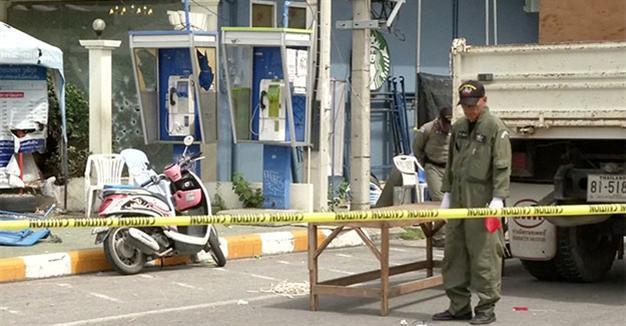4 dead as string of blasts hit tourist resorts in Thailand
HUA HIN, Thailand - Agence France-Presse

Police Explosive Ordnance Disposal (EOD) official inspects the site of a bomb blast in Hua Hin, south of Bangkok, Thailand, in this still image taken from video August 12, 2016. REUTERS photo
A string of bomb attacks hit popular tourist towns across Thailand, leaving four dead and many wounded, with authorities on Aug. 12 ruling out terrorism despite suspicions insurgents in the kingdom’s deep south are responsible.
In the normally peaceful resort town of Hua Hin, blood-spattered tourists were treated by rescue workers as forensic teams picked through the rubble, with police scrambling to reassure visitors the situation was under control.
“This is not a terrorist attack. It is just local sabotage that is restricted to limited areas and provinces,” national police deputy spokesman Piyapan Pingmuang said in Bangkok.
No one has claimed responsibility for the 11 bombings, and the seemingly coordinated attack across five provinces does not match common patterns of violence in the turbulent nation which is currently under military rule.
Analysts said Muslim insurgent groups could be responsible, but that the targeting of tourists far from their stronghold would be an unprecedented escalation in a simmering conflict largely contained to the southern border region.
Some observers said that anti-junta forces could be plotting to discredit the regime, which has staked its reputation on bringing stability to the kingdom after a decade of unrest.
“The bombs are an attempt to create chaos and confusion,” Prime Minister Prayut Chan-O-Cha told reporters as he called for calm.
Britain and Australia reacted by advising their nationals to avoid public places.
Worst-hit was the upscale resort of Hua Hin which was rocked by two sets of twin bombs in 24 hours - one pair on Aug. 11 night and the second on Aug. 12 morning. Two people were killed and more than 20 wounded, including foreigners.
A further two blasts struck Aug. 12 at Patong beach on the popular tourist island of Phuket while three more were reported further south - two in the southern town of Surat Thani, killing one, and one more blast in Trang, which also left one person dead.
A Thai police spokesman said a total of 10 foreign tourists were wounded, including two Italians and one Austrian. Embassies in Bangkok said four Dutch and three Germans were also among the wounded.
Thitinan Pongsudhirak, a political expert with Chulalongkorn University, said the attacks were a “blatant challenge to the military,” which has ruled over Thailand since ultra-royalist generals seized power in a 2014 coup.
“A military government like this is supposed to be about law and order,” he told AFP.
The attacks came less than a week after the junta saw its draft of a new constitution approved in a referendum, giving the generals a fresh claim to popular legitimacy.
However rights groups criticized the junta’s bans on debate and campaigning in the lead up to the poll, calling it far from free or fair.
One region that voted down the constitution was the “deep south” - the three southern border provinces home to a long-running Muslim insurgency against the majority-Buddhist state.
Zachary Abuza, an expert on Southeast Asian militant groups, said that while the southern insurgents had not carried out coordinated attacks for years, it was possible “a small cell” was behind this assault.
“Whoever has perpetrated these wants to do serious damage to the Thai economy. That is where the junta is the most vulnerable.”
Thailand’s deputy police spokesman Krissana Pattanacharoen told AFP the improvised explosives were similar in style to those used in the deep south, but that it was “too early to draw conclusions.”
